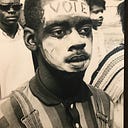A 242-year old taking “First Steps”…
Folks are so desperate to cite positive news coming from Washington, they are willing to latch on to anything that could be considered a “win”. Two years of having one ruling party — and a wannabe dictator — hasn’t accelerated our growth one bit. Nor, has it made us great(er).
So, to have our toxic Congress come up with something (anything) that is endorsed by the two majority parties is cause to pop the champagne, right? And, to get POTUS to agree with it is, well, that’s miraculous!
This First Step Act is the “Act Celebre’” in the waning days of the two years of a Republican majority Washington. As this has taken over “a generation” to achieve, you’d think it would be better thought out, wouldn’t you. Never mind that it only took 116 days for the Constitutional Convention to craft the original U.S. Constitution. Unfortunately, this has taken decades to get to this momentous day and it is still inadequate — so what is the next step?
___________
From Time Magazine
___________
I suggest that those who endorsed this bill, should listen to, and be prepared to have cogent responses to the dozens of organizations who have criticized what has now been signed. Did they seek guidance from organizations, like #JustLeadershipUSA or just the private prison lobby — or, the biased elected officials who embrace guilty (by Black or Brown or Immigrant) until proven innocent (sometimes too late)?
How does the #FirstStepAct next steps address the issues raised by #DeannaHoskinsin a recent Washington Post op-ed?
Laws are guided by “legal experts”, but often fail to answer a deep layer of questions — often, because those impacted by the law aren’t part of its creation. Therefore , the enacted laws consequences are often more INTENDED than unintended. That’s what immature lawmakers do. Babies, making “first steps” always stumble.
Here are a few follow-up, next step questions for those making “First Steps”:
1) How will e-carceratiin help people who are banned from living in some communities particularly, public housing? 2) How will it serve those who are seeking employment that might fall out of the legal range of the e-carcerated?
3) Who’s making/profiting from this technology?
4) Will home incarceration simply free up room for-profit prisons, so they can incarcerate more people?
5) Does denying early release for some criminals help keep prisons full? Is that the goal?
6) How do these “first steps” apply to white collar crimes? How about criminals who victimize Americans and our government?
7) Is race, racism, implicit & explicit biases addressed, explicitly, or just inferred, because the over-criminalization is understood to adversely impact people of color?
And, about that risk assessment thingy (I’m not a lawyer, so “thingy” is how I’ll describe it); what’s up with that? Who is determining “risk”?
Headlines exhaustively document the rush to judgement that many current systems hold over the heads of Black, Brown and Immigrant people. Our society easily bemoans the dangers of immigrant migrants & “Black on Black” crime, while “White on White” doesn’t seem to roll off the tongue so quickly. The dark scourge must be punitively addressed through legislation and incarceration. Meanwhile, the White folks killing their White spouses, children, dates, classmates, etc. doesn’t rise to the level of creating a phrase that lumps them all into the same criminal boat.
So, how will this bipartisan act work upstream to address issues the #SchoolToPrisonPipeline that Betsy Devos, — and the administration — endorses as so great? with her “school safety policy”. Yes, the education system is, unfortunately, inextricably connected to our education system. Are these folks talking to one another? What students have the ear of the Education Secretary and her advisors?
A cluster of questions for the 21st Century
I’m wondering how it helps places, like St. Paul, to address issues elevated through President Obama’s 21st Century Policing report, which was shelved when his successor came into power. Does it help or hurt? Why did, now former Attorney General Beauregard Sessions, work to undo that upstream work?
Innovation always has a cost — someone profits, someone loses. How will this “First Step” address folks who profit from incarcerating people? Are there plans to continue the work (again, started in the last administration) that stops the federal government from being a pipeline to private prisons.
Face it, theee are way to many questions and problems with this bill to starting putting bubbly on ice. Babies take “First Steps” — and they aren’t allowed to drink until they are of age. At 242 years young, this nation is WAY too old to keep walking like a baby. Grown ups, unlike babies, have the ability to ask questions. And, when it comes to Black & Brown people, we cannot afford to keep having babies/immature people deciding the fate of our county — especially through our (in)justice system. Nor, can we afford lawmakers to not act like adults and ask questions as much as possible, if they really want to fix things. As the smart voter that you are, I’d encourage you to demand that your government grow up.
